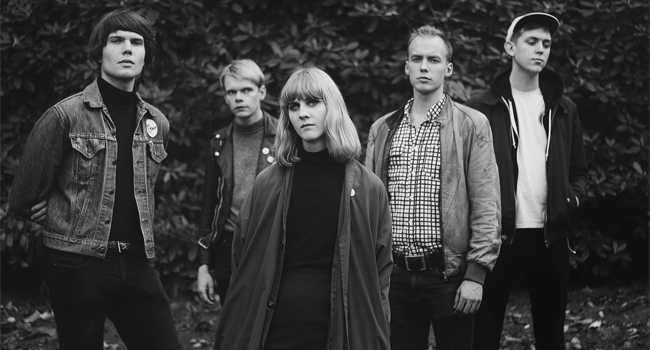Chicago-based band Old Fake knows the definition of “rock,” and they define it with an energetic stage presence.
While playing a show at The Mopery in Logan Square, bassist Colin DeKuiper accidentally collided into singer/guitarist Tom Smith’s headstock … with his own head.
“Colin’s known for his head banging,” Smith recalls. “[He] split his eyebrow wide open, blood just pouring down his face during the whole song. This is the most epic rock and roll moment of our lives.”
Despite the injury, DeKuiper soldiered on until the end of the set, gushing blood and all. He is now more cautious at shows. “Tom and I keep a little bit more distance than we used to,” DeKuiper says.
Old Fake, comprised of former Office members Smith and DeKuiper, along with drummer Mosses Shoshan, began a little less than a year ago. Since then, the band has raucously been making the rounds in Chicago’s underground rock scene, playing in smaller venues like The Hideout and The Mopery, alongside fellow Chicago bands like Blasted Diplomats and California Wives. More recently, the band opened for indie darlings Maps and Atlases at Lincoln Hall.
Old Fake’s sound is pure rock ‘n’ roll, comprised of heavy guitar riffs reminiscent of ‘90’s indie bands such as Sebadoh and Superchunk, and fast drum beats, courtesy of Shoshan’s vigorous style. Once, while playing a show with his former band the Thin Hymns, Shoshan played the drums so hard, he fell off his stool at the climax of the song.
“I was going crazy and had some drinks and I was going nuts, and then, I fell over and like, you know, it was just so funny,” he says.
Influenced by older sounds, it’s no wonder Old Fake approached its first release with a sense of nostalgia that’s recognizable in the band’s music. In January, Old Fake released 200 limited edition, pro-dubbed cassette tapes of cover songs, aptly titled Covers. The record includes selections from legends like David Bowie, Bob Dylan and The Rolling Stones, to local and lesser-known acts like Chicago-based Esoteric Tapioca.
The band’s process of choosing songs to be featured on the Covers tape was a rather simple one. They each made a list of songs they enjoyed listening to and eliminated ones they thought wouldn’t translate well into the band’s own sound.
“We picked stuff we all listen to, but it’s definitely within the range of the band,” DeKuiper says. “It’s not like we sound like the Bob Dylan song that we covered, but when you hear that song, they’re adaptable to each other.”
Shoshan expressed that the best part about doing cover songs is making them the band’s own.
“We all have playing styles we can’t shake,” says Shoshan. “Or you can shake it and then it sounds really bad. I remember that one time we were like, ‘Let’s stop this, let’s do this Old Fake-style.’ And we did it; it was awesome.”
However, Old Fake is by no means a cover band. For their upcoming album, Old Fake is aiming for a “realer” approach. The band is currently in the studio recording all-original material, slated for an early summer release. The Covers tape was meant to be a fun, playful project.
“We thought it was kind of funny for a band called Old Fake to have its first release be a covers record,” Smith said. “Especially to be on cassette, especially in a [limited] edition of [200] cassettes. We just thought it would be kind of hilarious.”
The band put down the funds needed to record the Covers tape, which was released on Chicago label Plustapes (one of many labels popping up that deal almost solely with cassette tapes) and distributed through smaller, independent record stores like Reckless Records and Permanent Records. The tapes can also be purchased directly through the Plustapes website and at the band’s shows. DeKuiper believes the tapes are a resourceful way of staying connected to Chicago’s intimate, do-it-yourself music scene.
“What I like a lot is it becomes like a community. Only people in Chicago are really going to know about it and get it,” DeKuiper says. “It’s not that bands don’t want to extend outside of that; it is going back to the fact that the [music industry] landscape’s changed, so you kind of got to work with what you can. But it’s a good way to put something out and to do a project that is physical and unique.”



